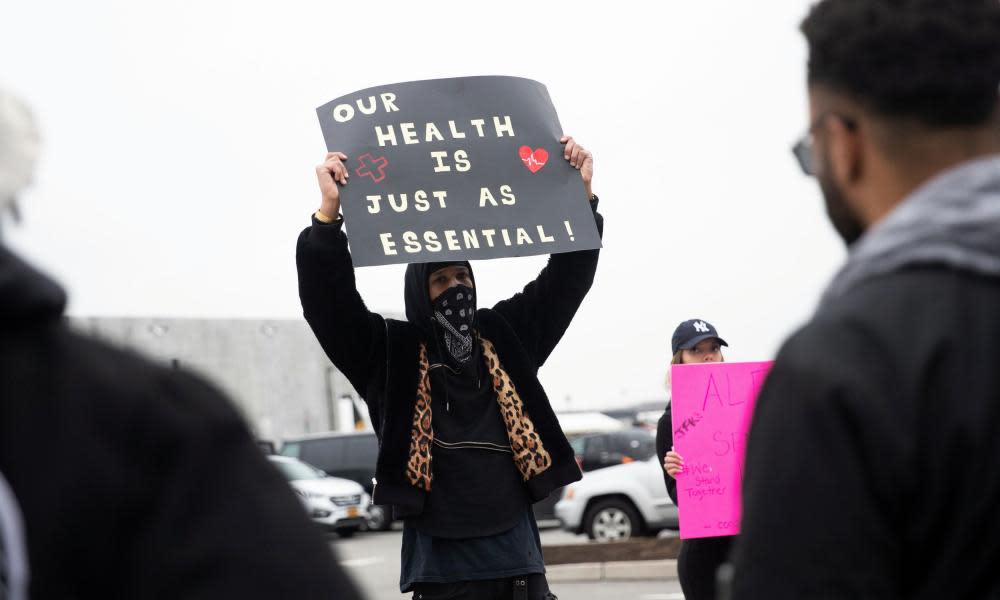There is no greater illustration of corporate America’s moral decay than Amazon

On Monday, Amazon fired a warehouse worker who had been protesting about conditions at a New York City facility during the coronavirus outbreak. Chris Smalls, an assistant manager and organizer, had led a walkout demanding Amazon temporarily shut the facility for cleaning after multiple workers tested positive for Covid-19.
It was a move that spoke to the inherent inhumanity of the trillion-dollar corporation, one that will need to be brought to heel by a future presidential administration. The workers were seeking hazard pay and more protective gear as they labored during the pandemic. This, along with Smalls’ willingness to challenge the company, was apparently too much to take.
Related: Why is Instacart making its contract workers risk their health to do their job? | Sarah Polito
Amazon claimed Smalls was dismissed because he had close contact with a worker diagnosed with Covid-19 but refused to stay home for 14 days. According to the company’s previous statements, the infected co-worker in question last reported for work on 11 March. Had Smalls been exposed that day, a 14-day mandatory quarantine would have made him eligible to return as soon as 25 March. Smalls, however, claimed Amazon did not send him home until 28 March, three weeks after the exposure.
Smalls is rightfully considering legal action and the New York state attorney general’s office is calling on the National Labor Relations Board to investigate. It’s likely Smalls was dismissed because he was a worker who dared to raise the consciousnesses of those around him. For a corporation as virulently anti-union as Amazon, workers like Smalls are particularly dangerous: they are the future leaders of a labor movement.
Amazon, perhaps the most successful corporation on Earth, can more than afford to turn a profit and treat their warehouse workers with dignity. Jeff Bezos will remain a billionaire if he chooses to pay every worker a middle-class salary with healthcare benefits and a pension. But doing so would require a slight reduction of his world-historical wealth and be a violation of the iron law of greed: more is always better.
There is no greater illustration of the moral decay of 21st-century corporate America than Amazon. Past behemoths trafficked in noblesse oblige, tolerating unions and even investing in their workforce. Automobile plants and steel mills accepted that the price of doing business was guaranteeing their workers more than a subsistence wage.
Amazon, which employs a well-compensated white-collar workforce and a vast range of warehouse workers who labor in punishing conditions to get products shipped all across the world, is not interested in the social contract. Rather than collaborate with their New York warehouse workers to safeguard their health amid the worst pandemic in a century – more American lives have been lost than on 9/11 and hundreds of thousands more could die – Amazon would rather leave an employee without a job at the worst possible moment.
The firing sends a clear message: come against us and you will be crushed. It’s raw authoritarian logic, instilling fear to smother all dissent. If Amazon merely eviscerated brick-and-mortar stores across America, triggering massive job losses, it would be an unfortunate company. But kneecapping the competition was never enough for Bezos. He needs to pit the nation’s cities against each other in a race to the bottom for extraordinary tax breaks, depriving them of revenue they could use to fund schools and public infrastructure. He needs to erect draconian warehouses where workers are forced to pee in bottles and pop pain medication to cope with prison-like conditions.
The coronavirus outbreak has laid bare the absurdity of predatory capitalism. An America without guaranteed sick leave and universal healthcare is particularly ill-equipped to protect its inhabitants during a pandemic. Into this void steps Amazon, a corporation that cares even less about the fates of those who serve it. It is, ultimately, an all-American company.
Ross Barkan is a writer and journalist in New York City

